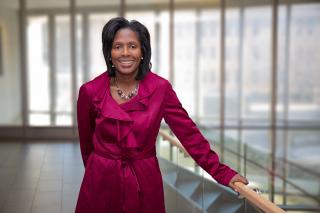Since I became president of Simmons University, I have met with several distinguished groups of alumnae and Bostonians who have graciously invited me into their networks. The rich discussions have prompted me to reflect upon the importance of mentorship, and the impact mentoring can have not just on our careers but for our lives.
We benefit and learn when we are mentored, and we lift one another up when we mentor others. And as we celebrate Women’s History Month, I believe it is especially valuable when women mentor women to build the next generation of women leaders.
Marian Wright Edelman, founder of the Children’s Defense Fund, once famously said, “You can’t be what you can’t see.” She was describing the importance of role models for women to imagine a future in fields where there are enormous gender gaps. And more broadly, mentors can help us see ourselves more clearly, helping us envision a path ahead we may not have previously imagined.
We have wonderful examples of the power of mentorship here at Simmons. Our Dotson Bridge and Mentoring Program serves African American, Latina, Asian and Native American (ALANA) students. With a support network of 21 mentors, the program helps ALANA and first-generation nursing students succeed in their studies and establish their careers. This program was made possible by a gift from Nursing alumna Phyllis Nickerson Dotson ‘62 and George Dotson in 2009, and already has positively impacted the lives of hundreds of Dotson Scholars.
Mentoring is an act of generosity, and of kinship.
I have spoken with many alumnae/i who point to Simmons faculty members as important mentors in their lives. Gwen Ifill ’77, ‘93HD often talked of the impact Professor Alden Poole had on her life and career, inscribing her book Breakthrough to him this way: “To Mr. Poole: Without whom I would never have pulled it off. Love, Gwen.” (The Ifill College created a Faculty Mentor Award in Professor Poole’s name.) Gwen became known for her mentorship as well, giving generously of her time and guidance to younger journalists, especially women of color.
For me, mentoring means so much more than professional coaching or skills instruction. A valued mentor can become a co-pilot in our lives. One who sees us as a whole person. One who empowers us to be our best selves. Mentoring is an act of generosity, and of kinship. Mary Church Terrell said that “we lift as we climb.” Creating inter-generational mentoring opportunities can be especially meaningful for all involved.
Of course, mentorship is a two-way street. Here are the guideposts I have developed in order to be a good “mentee” and make the most of the gifts all my mentors have given me: listen well; come into conversations with mentors prepared with questions and issues to work through together; follow up with gratitude for their time and guidance; and, as Gwen did, pay it forward by reaching out to those you might mentor and lift up.
On International Women’s Day, I recognized five women who have mentored me. As we mentor and as we are mentored, we create kinship networks that support all of us in the course of our careers — and our lives.

